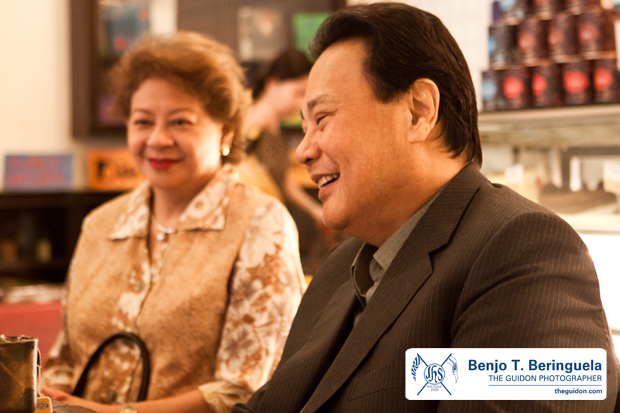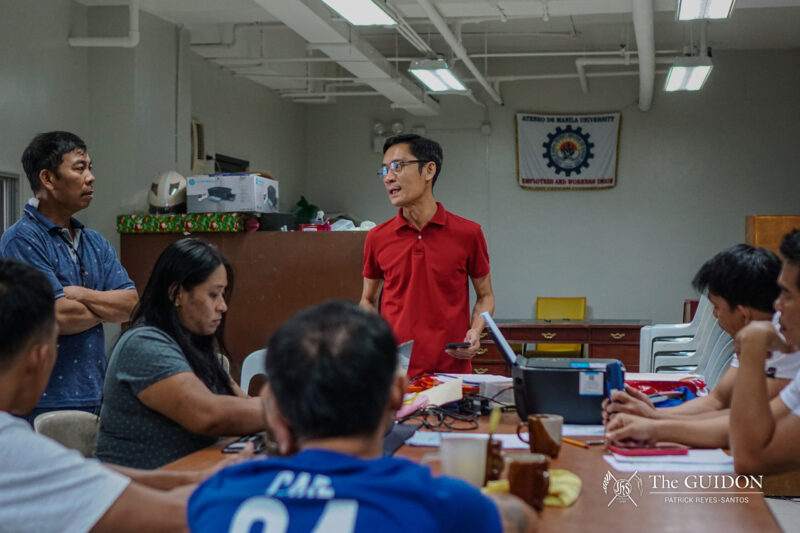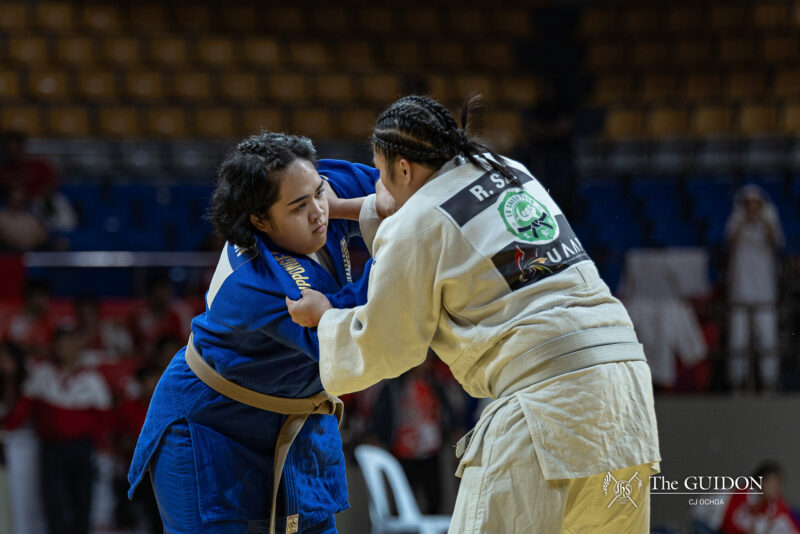
CLOSED CHAPTER. Former Chief Justice Renato Corona said that he has long moved on from his impeachment ordeal and is now in a new chapter of his life. Photo by Benjo T. Beringuela.
“I FOUGHT until the very end. I was bloodied for doing so, but at least I’m proud that I fought for the cause of judicial independence,” former Chief Justice Renato Corona said in retrospect, talking about his impeachment in an exclusive interview with The GUIDON held last August 22 at Café Xocolat in Loyola Heights.
Corona, who served as the Supreme Court’s chief justice for two years, is proud that he stood his ground during the trial. “No regrets. To me, I did everything with deliberation, with the full consciousness of the consequences.”
“I would’ve done the same thing if I’ve to live my life again. The important thing is that I fought a good fight,” he added.
Corona was convicted of committing culpable violation of the 1987 Constitution and of betraying the public trust, after failing to disclose $2.4 million and P80 million in bank deposits in his Statement of Assets, Liabilities and Net Worth. He is the first chief justice to be impeached in the country’s history.
The former chief justice shared that many had advised him during the trial to just resign, but he maintained that he was innocent. “Sabi ko, ‘Wala naman akong ginawang masama eh, bakit naman ako susuko?’ (I said, ‘I didn’t do anything wrong. Why would I give up?’)”
“On judgment day, if God asks me ‘How can you convince me that you did something for the least of my brethren?’ I’d say, ‘I came out with the Hacienda Luisita decision to favor the farmers, and I lost my job for it,’” he said. “I’m very proud of our decision in Hacienda Luisita because these people have been trying to get back their lives for centuries. It was my court, under my leadership, that finally granted it back to them.”
The long-time dispute over Hacienda Luisita ended with a Supreme Court ruling released last April 24 that ordered the total distribution of the lands to 6,296 farmer-beneficiaries. The 4,915-hectare sugar plantation estate was owned by the Cojuangco clan, kin of President Benigno Aquino III.
A new leaf
Corona said that the whole impeachment ordeal is already far from his life today.
“My family and I are lucky in a way because we’ve always been spiritual. We were able to move on quickly. To me, it’s a closed chapter,” he said.
Although currently unemployed, Corona said his hands are still full. Media outlets have still been pursuing him for interviews. “Invitations have not stopped coming in from different groups,” he said.
Corona, who believes that he has always been a teacher at heart, considered going back to the profession. He said that he had recently been teaching in the master of laws and doctoral programs of the University of Santo Tomas.
“I like interacting with students because I learn as much from them as they do from me,” Corona explained. He said that he would like to give special lectures on specific topics, such as constitutional law.
Sanggunian President Gio Alejo said, “I’m glad that he has moved on from that dark chapter. Despite that traumatic experience, he’s trying to get himself up again, trying to start a new chapter in his life and hopefully [trying to] find his own niche [on] how he can contribute to the welfare of the nation.”
The Assembly President Coco Navarro shared the same sentiment. “Corona still remains active in terms of looking for a career in line with what he used to do. At least now, he’s focused on the academe and he’s in pursuit of a noble profession,” she said.
In his younger days, Corona taught at the Ateneo Law School for 17 years. Also spending some time as a teacher in Loyola Heights, he established the legal management program for college students in 1979.
Coming of age
Corona graduated from the Ateneo de Manila Grade School in 1962 and High School in 1966. He obtained his AB General Studies degree from the Ateneo in 1970, and finished his Bachelor of Laws in the Ateneo Law School in 1974. He used to be the editor-in-chief of The GUIDON.
Corona recounted his fondest memories in the Ateneo from elementary to college.
“In grade school, we were treated like cadets in PMA,” he said. Corona recalled that the form of punishment during his grade school and high school days was getting spanked with a stick.
Corona shared that high school was memorable because that was the time that he started taking an interest in girls and in games such as black jack. He said, however, that his college life was the most unforgettable, since this was when he met his wife, then Cristina Roco.
In 1967, The GUIDON and then Maryknoll College’s Chi Rho produced a joint issue called GUIRHO.
At that time, Roco was the editor-in-chief of the Chi Rho, while Corona was the news editor of The GUIDON.
“I didn’t talk to her. I just saw her,” he said. “We were doing press work.” They met again the year after in a conference in Cebu, where they finally started breaking the ice.
Corona and his wife have been together for 45 years now. They have three children and seven grandchildren. “We put God at the center of our family life,” he said.
In the same interview, Cristina Corona, who accompanied the former chief justice, said that she would always support her husband in all his endeavors.
On politics and current events
“I think what the country needs today is systemic change. We cannot afford to have more of the same,” Corona said.
According to him, the political situation in the country has worsened since his high school years. “The people who are out of power are unpacking those in power, not because they really want genuine change or reforms, but they just want to get into positions of power so that they can do what those people are doing now,” Corona said.
“I’ve been chief justice of the Supreme Court. I’ve gone through life. I’m now a grandfather of seven. It’s still more of the same. When is this going to stop?” he asked.
Corona said that the many ills of Philippine society are present because of the absence of moral moorings among Filipinos.
“[People] have forgotten to seek God,” he exclaimed. “So we need to change the way we do things.”
For Corona, the answer is a change of heart among Filipinos.
He specifically called on Ateneans to value their education and to continue being men and women for others. “Having a social conscience and being responsible for your fellowmen… that’s the core value of our Catholic faith,” he said.
“We can impart this message to young people so that when they grow up, they’ll be responsible for their fellowmen, their families [and] the country in general. Every little thing starts with a ripple.”
In the interview, Corona also weighed in on the issue of the Reproductive Health (RH) bill. He said that he was “first and foremost a Catholic,” which only meant that he was against its passage.
He even went as far as suggesting that the faculty members in the Ateneo who signed a declaration of support for the RH bill resign from their positions, but clarified that he was not condemning them in any way.
On August 24, Aquino named Maria Lourdes Sereno as Corona’s successor and as the first female Chief Justice of the Philippines. “The appointment speaks for itself,” Corona said in a text message to The GUIDON sent on the same day. Corona did not comment on the issue any further.
New hurdles
However, a new case has recently hounded Corona and his family.
Last August 30, the Bureau of Internal Revenue filed tax evasion charges worth P150.68 million against Corona, his daughter Maria Carla Beatrice Corona-Castillo and son-in-law Constantino Castillo III.
In an interview with the Philippine Daily Inquirer, Corona said that the criminal charges filed against the three were “part of a continuing persecution by the Aquino administration.”
Preliminary investigations already began last September 25.








[…] You can ride mine and my co-writer Billy Poon’s article at http://www.theguidon.com/2012/10/corona-opens-up-about-post-impeachment-life/ […]